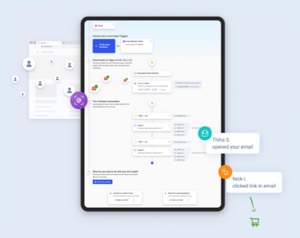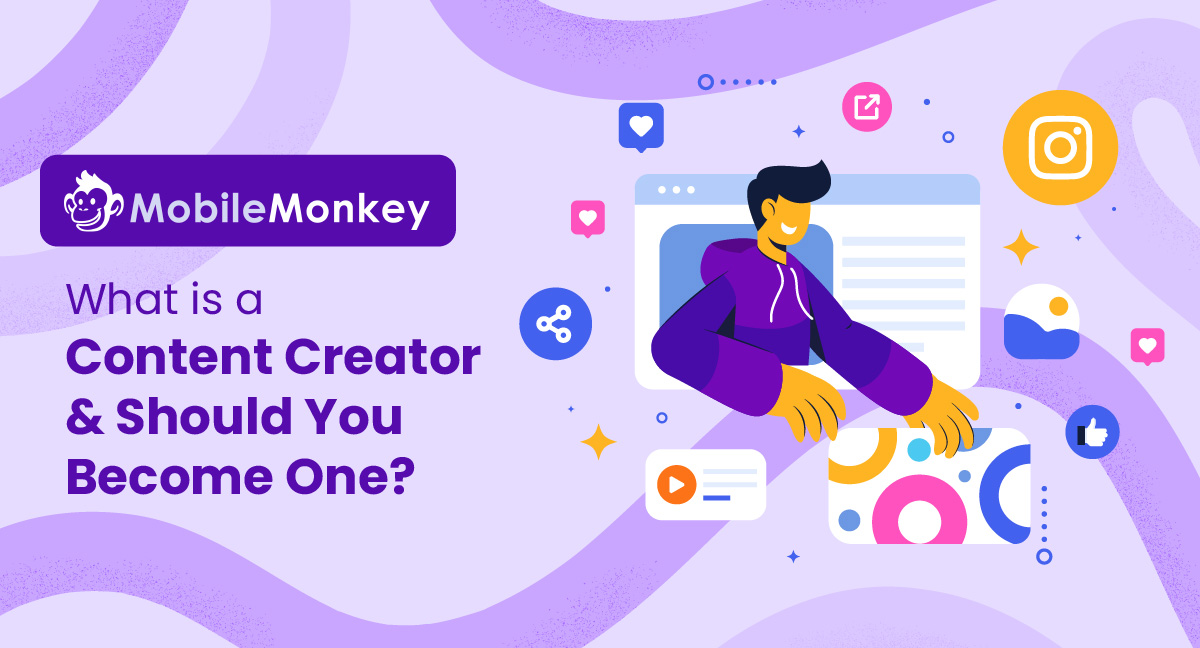What is a creator?
According to the Merriam-Webster Dictionary, a creator is someone who “creates by bringing something new or original into being.”
This is in line with what a content creator does. So, what defines a content creator in 2022?
If you create online content, especially videos for social media—and monetize them—then you’re a creator.
If you’re contemplating a career as a content creator and becoming a part of the creator economy, then this article is for you.

See Who Is On Your Site Right Now!
Get names, emails, phone numbers & more.
Try it Free, No Credit Card Required
Why become part of the creator economy?
The content creator economy is a rapidly growing market. This economic system is comprised of independent creators that connect to their audience via social media and the web at large. As of 2022, the sector is valued at over $100 billion.
The origin of creators
YouTube wasn’t always the mega video streaming site it is today. Prior to 2011, the site was mainly a platform for cute cat videos, parodies, and album covers. Sure, there were notable channels, such as Jenna Marbles and the Angry Video Game Nerd. However, this demographic was known as YouTube stars or YouTube celebrities.
In 2011, some of the more successful channels began partnering with the network Next New Networks (NNN). NNN took on the role of producer, assisting YouTubers in sharing and monetizing their videos. YouTube eventually acquired NNN and renamed it YouTube Next.
Just before the acquisition, NNN had created a program called the Next New Creators Program, designed to help YouTubers grow their subscribers. This was the first use of the word “creators,” and it stuck—“creators” just sounds edgier than “YouTube stars.”
What makes a great content creator?
If you create and publish content, you’re a creator. This applies to all forms of online content, including blogs, email newsletters, podcasts, and especially videos. However, being a great creator is a whole different ballgame. What do creators with followers numbering in the six- to eight-digit ranges have in common? Here are the attributes of a successful creator:
- Active on multiple social media channels, all linking to the main channel housing the content
- Consistent content production
- Responds to some of the comments
- Creates original content not already produced by creators in the same niche
- Occasional collaboration with other successful creators
The pros and cons of being a content creator
Becoming a creator is a legitimate career path. However, like all jobs, it has its pros and cons.
Pros of being a creator
- Create and monetize content on a subject you’re truly passionate about
- Content creators have full creative freedom to express yourself, provided it’s within site conduct guidelines
- It’s scalable: You can pursue the field as a part-timer or make it a full-time career
- You are your own boss
Cons of being a creator
- Building a following can take months and even years
- It may take months or years before you earn enough income to live off of or quit your day job
- For every PewDiePie or MrBeast, there are thousands of creators struggling to get their piece of the pie
- There’s no guarantee of reaching the same status as your favorite creators
What is a creator on social media?
Social media creators produce content for one or more social network channels. YouTube is a social network, so this includes the video streaming site.
Creators may use one channel to link to channels with their main content. For example, a creator may use Twitter to announce the release of a new YouTube video. The video contains a link in the description to a Pinterest page containing affiliate products.
How content creators differ by platform
Creators will usually be dominant on one platform while using other social media as support networks. Consider the differences among content creators of various social platforms:
YouTube
Anyone with a YouTube channel is a creator. However, the network classifies creators into one of two classifications: aspiring creators and established creators. Which one you belong to depends on your degree of success. Want to guess which category the likes of PewDiePie and Jake Paul fall under?
Successful Facebook profiles are also content creators. Through this medium, creators can start groups and optimize them with multiple media, including written, image, and video content.
Instagrammers are categorized more as influencers. However, while uploading a selfie doesn’t take the same amount of work as a comprehensive video, it’s still content.
A lot of Instagrammers also prefer the term “creator” over “influencer.”
TikTok
TikTokers create entertaining videos. This puts them more in the creators category, though some of the more successful TikTokers have huge influence.
Companies may use TikTok content creators as brand advocates.
Creators on Twitter may use multiple titles to brand themselves. This includes content creators and influencers. Some consider themselves artists; content like memes and GIFs is their art.
What is a creator vs. influencer?
You may also be familiar with the term “influencer.” Are creators and influencers the same? It depends on who you ask. Some people think the terms are interchangeable. This assertion isn’t entirely wrong, and there are certainly overlaps. However, there are a few distinctions.
Creator
Creators deliver high-quality content that their followers want to consume. Content creators monetize the content directly, making it their primary income stream.
How a creator makes money
- One-time or monthly donations
- Paid subscription services
- Sponsor shoutouts, usually at the beginning of a video
Influencer
An influencer is someone who, well, influences. Yes, they may create original content, but the emphasis is on persuading followers to take action.
The influencer’s goal is to get you to click the affiliate link, follow a brand, or sign up for a trial service.
How an influencer makes money:
- Affiliate commissions
- Brand endorsements
- Product mentions and placements
Creators do have influence, and influencers do create. However, creators are, first and foremost, content developers. Influencers are primarily brand ambassadors.
Can you become a creator?
Anyone who has the drive can become a creator. All it takes is a smartphone and an innovative imagination.
You’ll need the latter to create quality content that followers consume and demand more of.
You’ll need grit as there’s no such thing as overnight success. Even if a video goes viral, it doesn’t always translate to subscribers.
You can become a creator—but whether it’s a viable, long-term career path is a different story. You’re guaranteed a platform, but you’re not guaranteed success.
Streamline the content creator journey
Hopefully, we’ve answered the question “What is a creator?” for you!
If you want to become a creator, diversify your channels by having a multi-social media presence.
At Customers.ai, we make it easy by automating your Facebook, Twitter, and WebChat messages through a single platform. For Instagram users, make InstaChamp a part of your workflow with real-time DM messaging, autoreplies, and follower incentivization programs.
Try Customers.ai’s InstaChamp today and streamline the behind-the-scenes process as a creator!
Join Today’s Webinar with Larry Kim!
Or Register for the Free Replay
Learn all about NEW 100% Meta-Approved Automation Tools from Customers.ai with a spotlight on features to 10X Instagram & Facebook Engagement and turn social media into a revenue driver for your business.

FAQ – What is a Content Creator?
What is a content creator?
A: A content creator is someone who produces and shares various forms of digital media content, such as videos, blog posts, podcasts, social media posts, and more. They are individuals or groups who create and publish content online, typically through platforms like YouTube, blogs, Instagram, TikTok, and other social media platforms.
What types of content do content creators produce?
A: Content creators produce a wide range of content types, including videos, articles, blog posts, podcasts, infographics, images, animations, and more. They tailor their content to suit their niche, target audience, and the platform they use to share their work.
What skills do content creators need?
A: Content creators require a range of skills, including but not limited to:
- Strong communication and storytelling abilities
- Proficiency in content creation tools and software
- Creativity and a keen eye for aesthetics
- Understanding of their target audience and their preferences
- Basic knowledge of SEO (Search Engine Optimization)
- Adaptability to evolving platforms and trends
How do content creators make money?
A: Content creators can monetize their work through various channels, such as:
- Advertisements and sponsorships
- Brand partnerships and collaborations
- Product endorsements and reviews
- Offering premium content or subscriptions
- Crowdfunding platforms
- Merchandise sales
These revenue streams allow content creators to earn income based on their content’s popularity, engagement, and reach.
What is content creation, and why is it important?
Content creation is the process of generating ideas and producing engaging material for various platforms like blogs, social media, or videos. It’s important because it helps businesses connect with their audience, build brand authority, and drive traffic and sales.
How do you start with content creation for social media?
Start by understanding your audience, choosing the right platforms, and defining your goals. Use tools like Canva or CapCut to create visually appealing posts, and plan content with a calendar to stay consistent.
What tools are best for content creation?
Popular tools include Canva for design, CapCut for video editing, Grammarly for writing, and tools like Notion or Trello for organizing ideas.
What are the different types of content in content creation?
Content types include blog posts, videos, infographics, podcasts, social media posts, and live streams. Each type serves different purposes, from educating to entertaining.
How can content creation help grow a business?
Consistent, high-quality content builds trust, attracts new audiences, and nurtures relationships with existing customers. This translates into better engagement, loyalty, and conversions.
What does a content creator do?
A content creator develops material like videos, blog posts, or social media content to educate, entertain, or inform an audience. They often work with brands to promote products or services.
How do you become a successful content creator?
Focus on a niche, create consistently, engage with your audience, and use analytics to refine your approach. Building a personal brand and staying authentic are key.
What skills do you need to be a content creator?
Essential skills include creativity, storytelling, social media expertise, SEO knowledge, basic graphic design, and video editing.
What is the difference between a content creator and a social media influencer?
A content creator focuses on producing creative content, while an influencer leverages their audience to promote brands. Many influencers are also content creators.
What is an Instagram influencer?
An Instagram influencer is someone who has built a dedicated following on Instagram and uses their platform to influence purchasing decisions through sponsored posts or brand collaborations.
How do you become an Instagram influencer?
Choose a niche, post consistently, engage with your audience, and collaborate with brands. Tools like Later or Planoly can help with content scheduling.
How much do Instagram influencers make?
Earnings vary based on follower count and engagement. Nano-influencers can make $50–$500 per post, while top-tier influencers earn thousands or even millions.
What type of content works best for Instagram influencers?
Eye-catching visuals, short videos (like Reels), authentic captions, and interactive Stories typically perform well.
How do brands find Instagram influencers?
Brands use influencer marketing platforms like Aspire or Upfluence, or search Instagram using hashtags relevant to their industry.
What is a social media influencer?
A social media influencer is someone who has established credibility and a strong online presence across platforms like TikTok, Instagram, or YouTube.
How is a social media influencer different from a celebrity?
Celebrities gain fame through traditional media, while influencers build their audience through social platforms and niche expertise.
What platforms are best for social media influencers?
Popular platforms include Instagram, TikTok, YouTube, and LinkedIn, depending on the audience and content type.
How do social media influencers grow their audience?
They create relatable and valuable content, engage with followers, collaborate with others, and use trends strategically.
Why do brands partner with social media influencers?
Influencers can deliver authentic endorsements to a targeted audience, driving awareness, engagement, and sales.
What is the difference between content creation and content marketing?
Content creation involves producing content, while content marketing focuses on distributing it strategically to achieve business goals.
How do you measure the success of content creation?
Use metrics like engagement rates, traffic, conversions, and audience growth to evaluate effectiveness.
What are the best platforms for content creators?
Platforms like Instagram, YouTube, TikTok, WordPress, and Medium are popular, depending on the content type.
What is UGC, and how does it relate to content creators?
User-Generated Content (UGC) is material created by customers or fans. Many content creators specialize in UGC for brands to add authenticity.
Is content creation a good career?
Absolutely! With the growing demand for digital content, content creation offers creative freedom, flexibility, and income potential.
